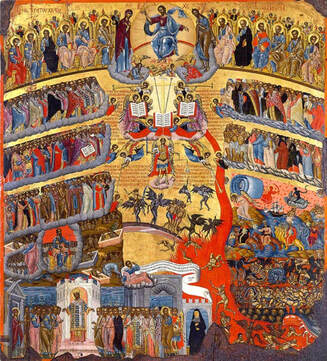|
This is a photograph of a planter in our garden. Every time I look at it, I see the eye of an elephant looking at me! What about the car on the right? I bet you see a smiley face. This tendency for the incorrect perception of a stimulus as an object, pattern or meaning is known as Pareidolia. This ability can be great fun and can be helpful in developing our imagination and creativity. However, as with most things there can be dangers associated with it too! This is not too dissimilar to reading the Holy Scriptures. One needs only to scan some of the contemporary popular ‘Spiritual/Christian’ books to see how incorrect perceptions and understandings abound. In our Gospel reading for this Sunday we read our Lord’s parable of the Last Judgment. When Christ will come and judge us. When “All the nations will be gathered before Him, and He will separate them one from another, as a shepherd divides his sheep from the goats. And He will set the sheep on His right hand, but the goats on the left” (Mat 25v32-33), and how “…He will also say to those on the left hand, ‘Depart from Me, you cursed, into the everlasting fire prepared for the devil and his angels” (v42). These verses can leave us anxious and fearful; they can leave us with the image of a God who judges with a strong belief in retribution and punishment. Equally we can read how “Come, you blessed of My Father, inherit the kingdom prepared for you from the foundation of the world: for I was hungry, and you gave Me food; I was thirsty, and you gave Me drink; I was a stranger, and you took Me in; I was naked, and you clothed Me; I was sick, and you visited Me; I was in prison and you came to Me.” These verses may lead us to think that what God requires of us is social activism. A God who is not so interested in the person but rather the ‘common good’. These thoughts and impressions may have a degree of validity, but if this is all we see then we are missing the point of the parable. This parable is about Christian love – no more, no less. Love of God and love of neighbour. We each have a responsibility to love. It may not be possible to perform great humanitarian acts, to feed or provide drink for the hungry and parched of this world, to house the homeless and destitute, or to visit the sick or those who are incarcerated. But we can all take responsibility for sharing the love we have in Christ with those who share that small part of Gods kingdom for which we have been made accountable. Remembering “… inasmuch as you did it to one of the least of these My brethren, you did it to Me.’ (v40) As we begin our preparations for the Great Fast, we need also to ensure that our perceptions and understanding of what is required of us as we fast are correct. The Christian life is essentially directed toward three focal points – God, our neighbour, and our soul. Through prayer we orientate ourselves toward God; almsgiving turns our attention toward neighbour and fasting toward self. There are few references to fasting in the New Testament, not because it can be ignored but because it is assumed; ‘Moreover, when you fast,…’ (v40), not ‘If’ but ‘When’! For most, a fast is an extended period of time when one eats nothing. And for the early Church this was what fasting was. However, for us, the practice is (with welcome modifications) a vegan diet with crustaceans permitted. It is not something to be undertaken to show one’s piety, “Moreover, when you fast, do not be like the hypocrites, with a sad countenance. For they disfigure their faces that they may appear to men to be fasting…when you fast, anoint your head and wash your face, so that you do not appear to men to be fasting.” (Mat 6: 16-18). Like prayer and almsgiving, fasting is, in a literal sense, practical; it is something we do; Jesus expects it and the church requires it. Because, as Fr Thomas Hopko teaches us ‘The effort enlightens the mind, strengthens the spirit, controls the emotions and tames the passions. And so, as we prepare and continue on our journey to Pascha let us stand with Blind Bartimaeus and say “Lord, that I may receive my sight.” (Mark 10 v51). Let us be sure about what we are looking at. Let us not be deceived or misled by incorrect perceptions or understandings. Let us not live in fear judgement and retribution but rejoice in the God who is love. Let us not focus on what we are giving up but rejoice in what we are gaining. Father Julian  "“Let us not be taken prisoner by our eyes; let not our tongue delight in costly food, for once they have been eaten they are worthless; let us shun all greed, then we shall not become slaves to the passions which follow an excess of food and drink (Triodion)
0 Comments
Leave a Reply. |
Parish Blog
This mainly contains homilies and messages from our priests, although there is some scope to share thoughts and interesting articles which we may want to share with others Archives
October 2022
Categories |

 RSS Feed
RSS Feed